POP-UP CULTURE
Now you eat it, now you don’t – the pop-up restaurant craze
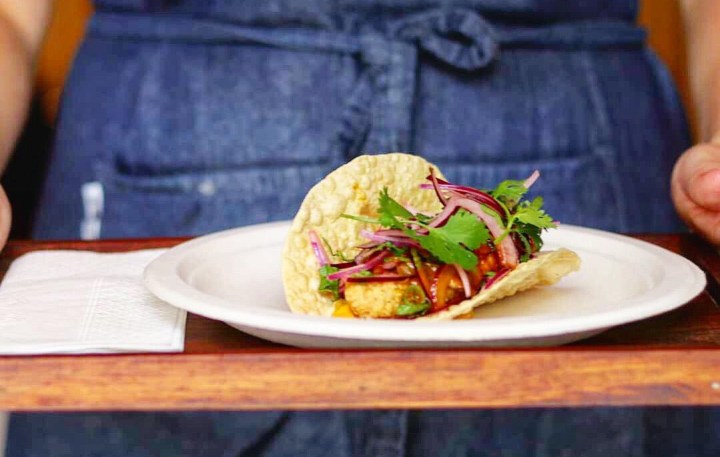
Street-bought organic chicken in Khayelitsha, Chinese hot pot in Pretoria, ‘Farmers’ caviar’ on a KwaZulu-Natal agro-ecological farm. Intrepid pop-up restaurateurs are adding ingenuity, breadth and texture to the food scene throughout South Africa.
Do a Google search for “pop-up restaurant” and your screen fills with a list of surreal, semi-adult sounding Disney experiences:
“Lidl launches new Dublin pop-up restaurant where guests will eat in the dark”
“Raise your Cosmo to this ‘Sex and the City’-themed Atlanta pop-up”
“Chips Ahoy! The pop-up restaurant plan for an historic old lifeboat station [in Wales]”
“Pop-up restaurant in soaring Swedish gondola opens for sustainable diners”
This last one – dinner in a gondola – was hosted over Easter weekend by celebrated Chef Magnus Nillson of Sweden’s Fäviken 1,280m above the Åre ski resort. Tickets were given to a fortunate few who made their way to Åre sustainably… by train, electric car, or one can surmise, on skis, like James Bond would’ve done.
In South Africa, we have the occasional celebrity pop-up, although not on a gondola. We’ve hosted Michelin-starred chefs from Europe, and our own Luke Dale-Roberts has done pop-ups in Mauritius and New York.
But most people who do pop-ups don’t have that kind of celebrity. Rather, they’re entrepreneurial, creative types who’ve chosen an alternative model, for the short or long term. Some are on a path to a bricks and mortar restaurant or are building a brand; others are highlighting a philosophy or way of life, and a few do it because, to them, a permanent restaurant would feel like a prison – creatively and financially. What’s exciting for us is that pop-ups open the door to a range of new eating experiences.
Doing the hustle
Most pop-ups have a short life span – a lunch, a dinner or a weekend – and are part of somebody’s greater hustle. Chefs and twin sisters Lebo and Tebo Ndala of food company With Love From the Twins do about four pop-ups a year, alternating between Johannesburg and Pretoria, always in a new location. When they started about four years ago, they were producing some of Gauteng’s first pop-ups.
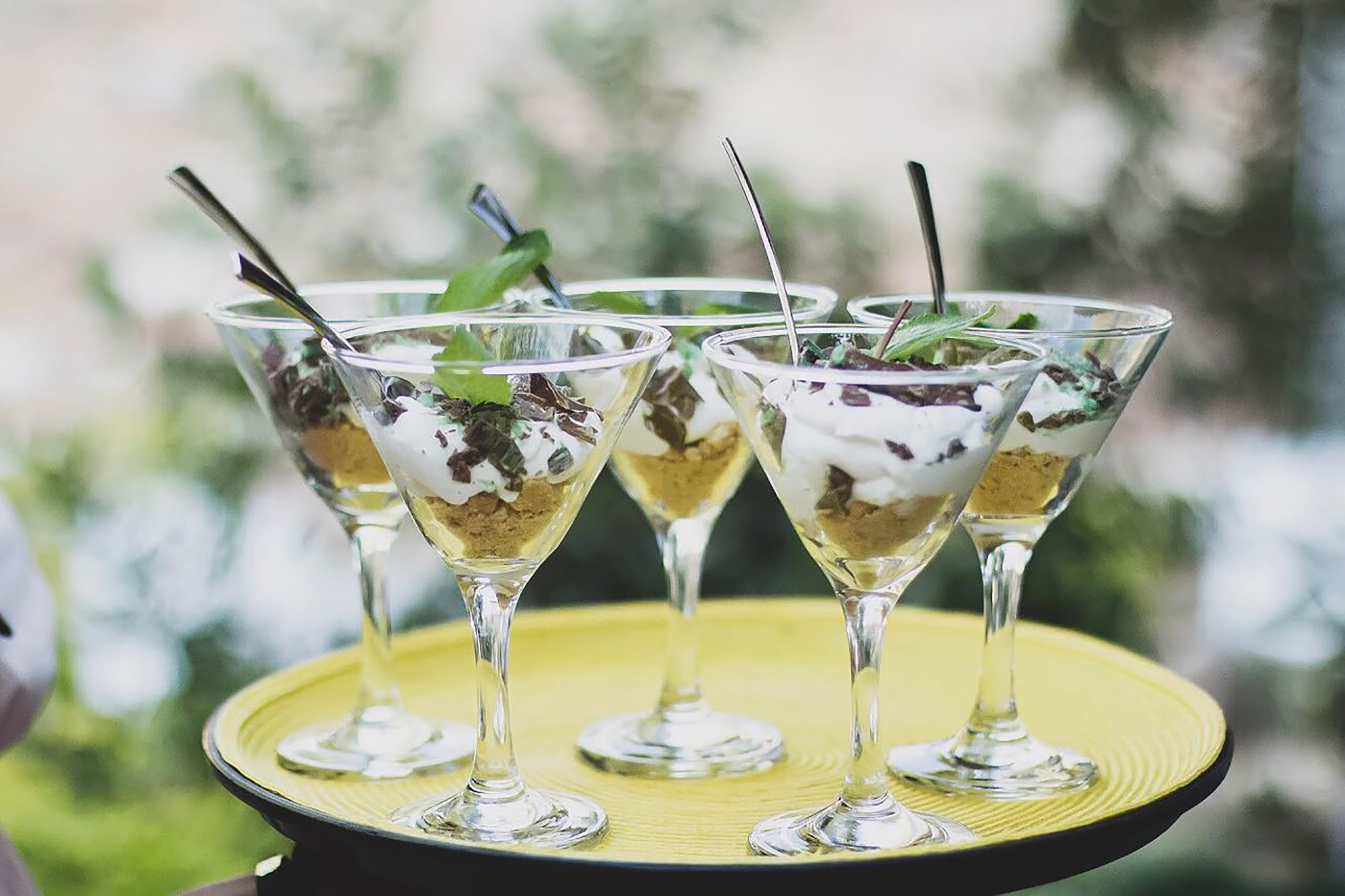
Delights from a With Love from the Twins pop-up.
“There are now a lot of young private chefs hosting lovely events,” says Tebo.
Their first was a high tea held at a Pretoria tea shop.
“Our headmaster used to tell us you should go to the Mount Nelson for tea. We wanted to, but it was too expensive. We thought we should create this for ourselves.”
Since then, they’ve done 13 pop-ups, from a Parisian breakfast to a coffee and chocolate tasting to a South African heritage meal. Their next is likely to be centred on a Chinese hot pot, a social cook-your-own-food-in-a-simmering-stock experience inspired by a recent trip to China.
“We normally host about 30 to 40 people, as often as we can at one long table, and try not to make it too expensive, keeping it at about R300 per person,” says Tebo.
The pop-ups serve as vital marketing for their company: the Ndalas work as private chefs and brand ambassadors, and the events help attract new clients as well as brands.
Marketing can be a challenge – “a little stressful, when you don’t have such a big following” – as can be finding an appropriate venue.
“Sometimes restaurants refuse, as they are not comfortable allowing people to cook in their space,” says Tebo. “We try to convince them that it’s good marketing for both of us.”
The Ndalas love the diversity of experiences they provide and hope to some day be hosting pop-ups in other cities.
In Cape Town, Zuko Mdatyulwa, who goes by the name NotoriousChefSage, does one to two pop-up Sunday brunches a month – called Brunch at Hidden Gems – at his Khayelitsha home (the next two take place on 11 and 25 May).
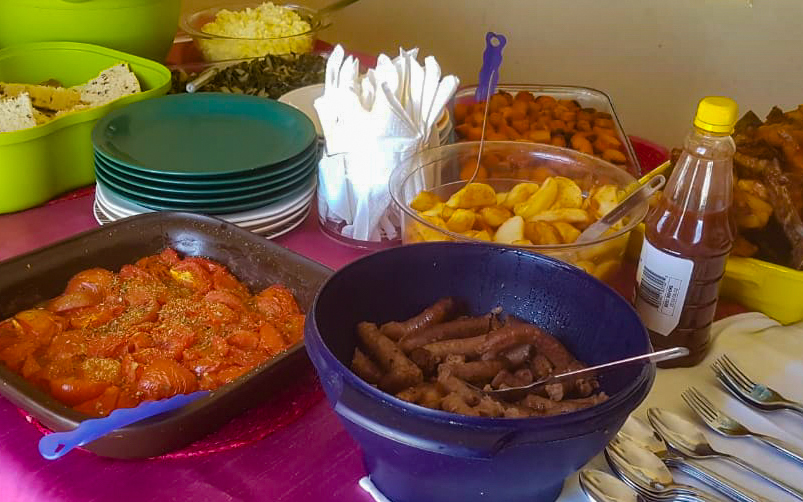
A Hidden Gems pop-up.
“When I’m not doing pop-ups, I’m catering private events and meetings.”
Mdatyulwa is also taking business classes at Oribi Village (a nonprofit collaborative incubator for social entrepreneurship) where he’s learning how to formulate his business in a sustainable way. His guests are a mix of locals and overseas tourists. The tourists tend to be more intrepid than white Capetonians when it comes to visiting the townships, he says.
“A lot of [local] people who are sceptical — I tell them you should just get out of your comfort zone. Eventually when they see the content on social media and hear from friends about how much they enjoyed the experience, they realise I can go to Khayelitsha too and have this experience.”
The pop-ups grew out of informal weekend get-togethers at Mdatyulwa’s home and connections he’s made with local food growers. He can host up to 30 people and the cost is R100 a person. His mom does a few classics – steamed bread and vetkoek – and he gets more creative, mostly with produce from local gardens and farms like Ubhule Bendalo Foodgardens, a Khayelitsha Site B farm, and Ikhaya Garden, an organic garden at a local primary school. He’s still looking for a butcher he can work with, and tries to support “the local mamas selling organic chicken on the street”. There’s a collaborative energy in Khayelitsha, he says, that is helping make a growing number of pop-ups successful.

Hope Malau.
Having a stall at a market is just another kind of pop-up, in my books. Chef and food writer Hope Malau has recently taken his new business Hope(ful) Foods to Cape Town’s Neighbourgoods Market at the Old Biscuit Mill on Saturdays. During the week, Malau cooks and delivers traditional home-cooked favourites like pig trotters with samp and sweet mash, tripe and steamed bread, and kotas to offices in Cape Town’s CBD and Northern Suburbs.
“There were no restaurants or shops that sell traditional food during lunch time,” he said. “People were going crazy for my kota and chicken feet. I thought, let me do the same thing in urban spaces.”
Malau had previously worked behind the scenes at markets to supplement his income, so knew how they worked, and what he was getting into: a pop-up still carries risk, with stalls costing about R500 to R1,000 a day.
“There were not many black people selling in urban markets. Most didn’t know about them or how to get in.”
Market spaces are coveted, says Malau, and you need to differentiate your offering. Pitso, a long-time stall holder at the market (who recently opened AfroBar & Pitsos Kitchen on Long Street), has been helping him, telling customers: “You want a kota, you go to Hope’s stand.”
While Pitso (see his own story in TGIFood) does cow’s head, chicken feet stew and tripe, Malau offers fried chips, kota, vetkoek with mince and ice pops. Competition is good, says Malau.
A restaurant within a restaurant
A pop-up with a limited run offers a way to pilot a restaurant concept without the associated risk and cost. How great is that cost? Liam Tomlin, chef/proprietor (and in some cases co-proprietor) of five Cape restaurants – Chefs Warehouse, Thali, Chefs Warehouse Beau Constantia, Chefs Warehouse at Maison, and Jewell’s (opening in early May) – reckons it would take R3- to R5-million to open a 60 to 65-seat fine dining restaurant in Cape Town today.
“You can spend as little as R200,000 and as many millions as you want,” Tomlin says. “The big costs are things customers will never see: like plumbing, electrical, extraction, fire systems. I like to try to recoup what it cost me in Year One.”
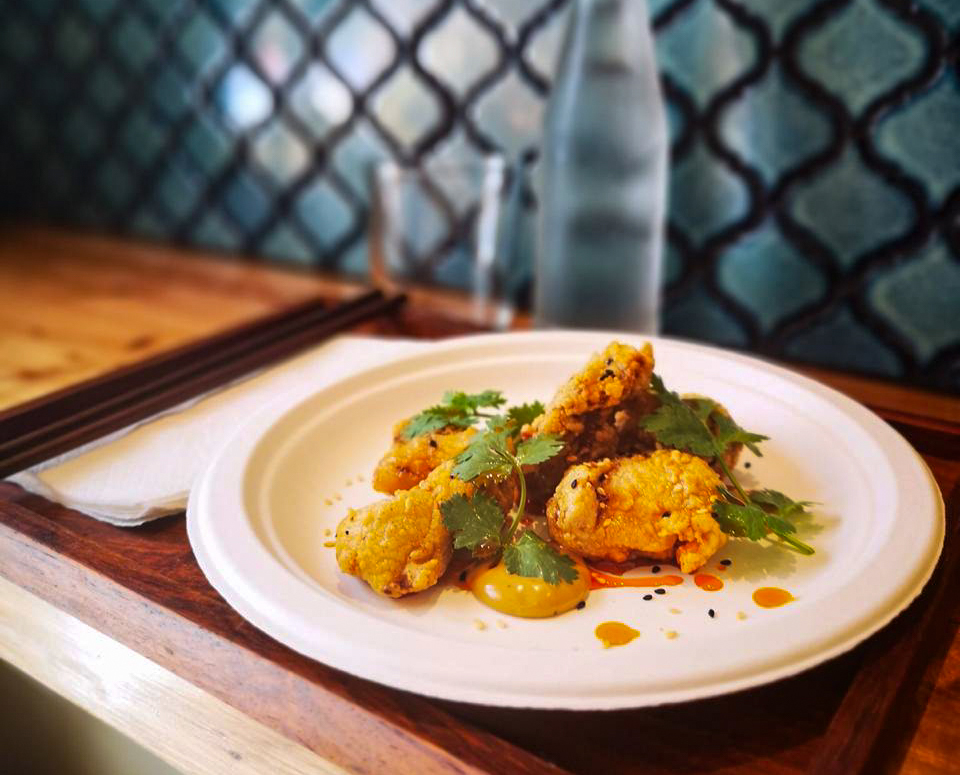
Melting Pot’s fried chicken.
John van Zyl, former head chef at two of Tomlin’s restaurants, is just over halfway through a three-month pop-up on Cape Town’s Loop Street. It was started with a R50,000 investment and two working partners, girlfriend Sage Fell and long-time friend and chef Stefan Roos, who’s cooked at Terroir and Thali. The Melting Pot, which runs until mid-May, is a tiny casual 12-seater pop-up in a restaurant space called Marrow, whose owners have taken a three-month break. The Melting Pot team had the advantage of a fully equipped kitchen: the R50,000 went towards extra equipment that made the kitchen even more workable. Six weeks in and they’d made back their investment.
At The Melting Pot, you order at the counter. Your food is served on paper plates with bamboo cutlery and chopsticks, but make no mistake, there’s nothing low budget about the food even though no dish is priced over R75.
This is some of the most exciting food currently being served in Cape Town, and a trip around the world with a short, changing global line-up of simple street-food-inspired dishes. Where else do you see Peruvian ceviche, Thai steamed fish, aloo tikki (deep-fried Indian potato cakes), fried chicken bao, pork ramen, Persian lamb flatbread and Sri Lankan dhal on one menu? While ingredients are sourced from purveyors Van Zyl used in his Chefs Warehouse days, the pop-up offers accessible prices, largely because the only staff, besides one sculler, are the three partners, working six days a week, 16- to 18-hour days. A downside, but then again, this is restaurant life reality, whether you’ve taken over someone else’s space or it’s your own.
What happens after the pop-up? Van Zyl says he thinks he want to open a restaurant, but needs to find the right location. Yet it’s clear he has some reservations: one, his love of travel – he’s been to many of the countries that have inspired his food – and another, the state of the economy.
As Tomlin says, “It’s wonderful for young people like Johnny to test the water to see if they want to take the plunge. I’d much rather risk R50K than R3-million.”
Van Zyl already had a leg up in the early stages, with a respected name in the Cape Town foodie community, but acknowledges that without that, it would be much harder – by the time you’ve made a name for yourself you’d be days from closing.
When there are no rules
Pop-ups keep things fresh, and for chefs like Pretoria-based Khanya Mzongwana, the ever-changing nature of pop-up life allows her freedom to flourish.
“The need for income is important, but everything I do is geared towards creative fulfilment, and wanting to create a beautiful loving food scene,” she says.
Mzongwana started Off the Wall, a collaboration with DJ Bubbles, a few years ago; today she’s about to launch No Rules Cafeteria, a seasonal pop-up which begins with six weekend pop-ups at No End Contemporary Art Space in Linden, Johannesburg. The first takes place on Mother’s Day weekend, 11 and 12 May – a Saturday night dinner and Sunday lunch – and will be an all-woman collaborative convergence of Mzongwana’s bold and beautiful comfort food and music curated by pro femme Pussy Party in a gallery space.
“Pop-ups are my hustle of choice,” says Mzongwana, who also does food styling and writing, and is a brand ambassador.
“With a pop-up, versus having a restaurant, it’s like being the cool aunt who babysits for a day and gives the little brats back the next day! A quick dining experience also brings exclusivity which you won’t get from a fixed space. A pop-up encourages me to cook a dish that I’ll cook once and might never cook again.”
When putting together a pop-up, sponsorship helps, says Mzongwana, as does having another income on the side. Working with brands is giving her lots to play with on the drinks side. She is always on the look-out for potential collaborators: “I feel every connection can be potentially very important.”
Legit farm to table
As Mzongwana says, with pop-ups there are no rules, which is why it shouldn’t be surprising to find a monthly pop-up on a 10-hectare KwaZulu-Natal agro-ecological farm. For nearly three years, Richard Haigh of Enaleni Farm (between Durban and Pietermaritzburg) has been doing monthly Eataleni pop-ups, an edible way of sharing his experience of growing and protecting heritage plant and animal breeds (breeds that haven’t been tampered with by industrialised farming systems).
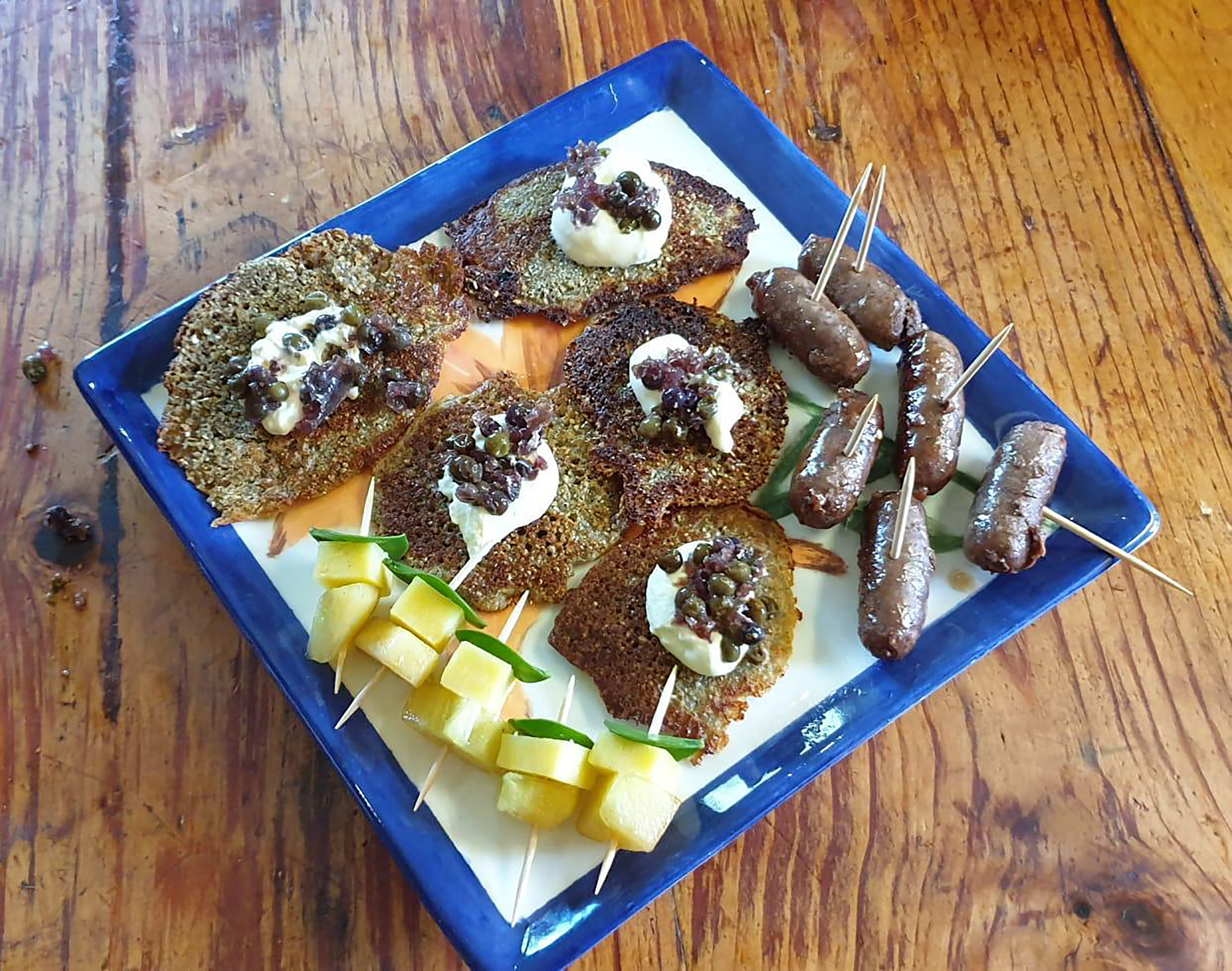
Nibbles at Eataleni.
“Everything you eat comes from within a 150m to 300m radius of your plate,” says Haigh. This includes the yoghurt, cheeses and butter he makes from his own dairy cows and meat from heritage animals he raises – Nguni cattle, eight varieties of fowl, indigenous imvu sheep and lamb.
Haigh, who cooks everything himself and serves a lunch for about 40 in his sitting room, is doing it for the love and education of others.
“Life’s too short just to serve nice food. I’m interested in food with a story, with freshness, and to have a meaningful encounter.”
“The whole point of Eateleni is what happens in between the courses,” says Haigh, who takes those opportunities to give a short talk about how he farms or invite guests to go outside and walk in the garden.
“When they hear our huge gong, they’ll know it’s time for the next course.”
This might be a Farmers Caviar made with indigenous umsobo and served with sour cream on a pearl millet blini, or a turkey, purple sweet potato and edamame terrine.
Would a pop-up work in laid-back Durban, its food scene far removed from that of high energy Gauteng and food-obsessed Cape Town? Chef, caterer and food stylist Justine Huizinga of Beetroot and Bear, who returned to KwaZulu-Natal after 17 years in Cape Town, isn’t sure, but is considering doing one this year. Her vision is to showcase “KZN’s incredible growers and producers” with monthly or bi-monthly pop-ups in a central space.
“I want to show people that vegetables truly can be the heroes of the meal.”
She’d get growers and producers involved, letting them explain to guests what they are doing, and there’d be communal cooking and possibly shopping involved.
But is there a market for this in KwaZulu-Natal? She’s not 100% convinced.
“There is less disposable income here than in Joburg or Cape Town, and a relaxed last-minute attitude towards going out. If it rains in KZN, you can forget it… no one’s going out!
“Any person who loves to cook wants to share their food. It’s like giving a piece of yourself, and it can be such a community building exercise. But the economic climate has to be right.”
Regardless of the format, pop-ups seem to offer more potential than risk.
Says Mzongwana: “As someone who has always worked with what I’ve got, hand to mouth, I think the good news is that you can do anything.”
Which is great news for South African eaters. DM





 Become an Insider
Become an Insider